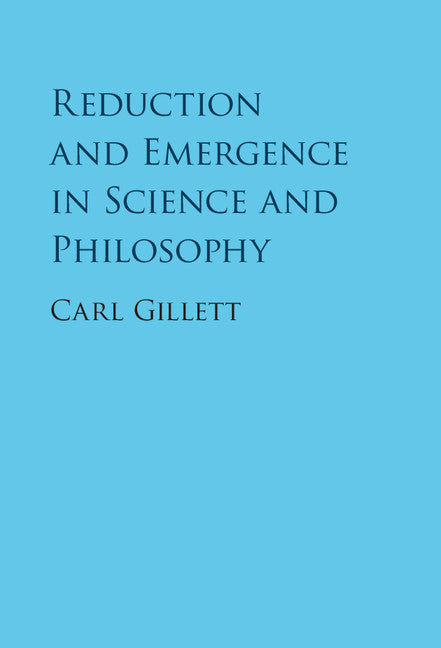Freshly Printed - allow 8 days lead
Couldn't load pickup availability
Reduction and Emergence in Science and Philosophy
Analyses the ongoing scientific debates surrounding reduction and emergence, arguing that these debates are empirically resolvable.
Carl Gillett (Author)
9781107075351, Cambridge University Press
Hardback, published 8 September 2016
400 pages
23.6 x 16 x 2.8 cm, 0.73 kg
'Carl Gillett's masterful book is a comprehensive and original contribution to the philosophical discussion of emergence and reduction in science and philosophy.' Barry Loewer, Rutgers University, New Jersey
Grand debates over reduction and emergence are playing out across the sciences, but these debates have reached a stalemate, with both sides declaring victory on empirical grounds. In this book, Carl Gillett provides theoretical frameworks with which to understand these debates, illuminating both the novel positions of scientific reductionists and emergentists and the recent empirical advances that drive these new views. Gillett also highlights the flaws in existing philosophical frameworks and reorients the discussion to reflect the new scientific advances and issues, including the nature of 'parts' and 'wholes', the character of aggregation, and thus the continuity of nature itself. Most importantly, Gillett shows how disputes about concrete scientific cases are empirically resolvable and hence how we can break the scientific stalemate. Including a detailed glossary of key terms, this volume will be valuable for researchers and advanced students of the philosophy of science and metaphysics, and scientific researchers working in the area.
Preface
Introduction
Part I. Groundwork: 1. Scientific composition, the universe and everything: or, reductionism and emergentism in the sciences and philosophy
2. A beginning framework for scientific composition
Part II. The Roots of Reduction: 3. How to be a scientific reductionist: defending 'nothing but' claims and an ultimate scientific image
4. Understanding scientific reductionism: fundamentalist views of ontology, laws, theories, and methodology
Part III. The Fruits of Emergence: 5. The varieties of emergence: their natures, purposes and obligations
6. A whole lot more from 'nothing but': conditioned aggregation, machresis and the possibility of strong emergence
7. Understanding scientific emergentism: a mutualist nature and its interdependent levels, laws and sciences
Part IV. New Landscapes, New Horizons: 8. Our competing visions of nature and the sciences: illuminating the deeper debates and viable positions
9. Making the issues concrete: the scientific hypotheses and their empirical differences
10. The age of reduction versus the age of emergence: what has been successfully shown from the sciences (so far)
Glossary
Bibliography
Index.
Subject Areas: Educational: Sciences, general science [YQS], Mind, Body, Spirit [VX], History of science [PDX], Philosophy of science [PDA], Science: general issues [PD], Philosophy of mind [HPM], Philosophy: epistemology & theory of knowledge [HPK], Philosophy: metaphysics & ontology [HPJ], Philosophy [HP]


